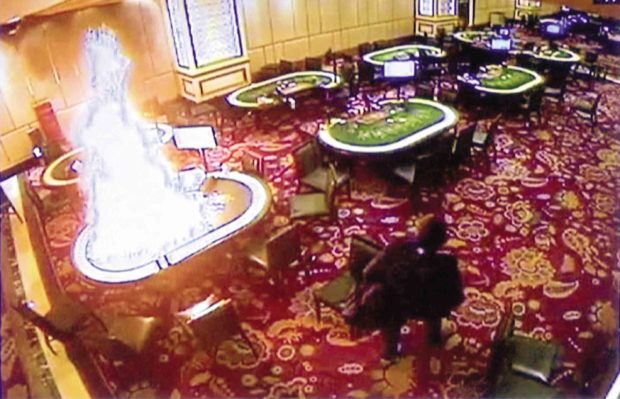Casino tragedy probe cites long list of lapses

A security video grab shows the gunman torching one of the gambling tables upon entering the Pasay City casino. —AP
No one was in “command and control” of the security situation at Resorts World Manila (RWM) when the armed Jessie Javier Carlos went on a rampage in the early hours of June 2, according to the ranking police official leading the investigation into possible lapses on the part of the hotel security personnel.
Chief Supt. Jose Mario Espino, head of the Philippine National Police-Supervisory Office for Security and Investigation Agencies (PNP-Sosia), also said there was “no emergency response team” that could have prevented Carlos from wrecking havoc.
“There (was) no concrete reaction team to call. There (was) no command and control or so-called crisis management,” Espino said in a press briefing on Tuesday, revealing the initial findings of the probe that seeks to determine the administrative liability of NC Lanting Security Specialist Agency, which provided guards for Resorts World.
RWM had an in-house security team but they are not covered by the PNP-Sosia investigation.
“The guards on duty at the time were really for fixed posts at the parking area, the entrance and exits and one roving guard for the whole mall area,” Espino said. “So when you ask for a quick reaction team, they did not know who will run because they have their own post to secure.”
Espino said the incident, which left 38 people dead, including Carlos who took his own life, also showed that RWM’s security personnel “relied so much on the PNP.”
“They waited for the PNP. But what if the PNP station is far away? Who will now react?” he said. “If we will review (what happened), there was no command and control at that time. As a colleague said, the Chief PNP was waiting (to know) what was happening but no one could tell him immediately. There was no ground commander.”
“(The PNP chief) was informed that everybody was evacuated (but it turned out) there were those left behind. That is what we are pointing out in command and control,” he added.
The RWM incident prompted Espino and other PNP officials to require other resorts, malls and hotels to submit security plans on which they could base their drills and rehearsals.
Their managers were also reminded “not to scale down” their security detail after midnight or during the graveyard shift, if they are operating 24/7. “That is what we learned. Because of the scaling down of personnel, this thing happened and it escalated, which should not be.” Espino said.
Security guards should always “operate on a buddy system,” he added, noting that at RWM that early morning “those manning the entrances and even the security guard who was roving were alone.”
These guards explained during the probe “that it was the instruction of the management that there should be only one. It is now being investigated. We are asking where is the written directive that you will only have one guard during that time,” he added.
Administrative offenses are penalized with fines. The PNP-Sosia probe would determine next whether NC Lansing as a company or individual security guards would be made to pay the penalties, the official said.
On Monday night, members of the Special Investigation Task Group “High Roller” returned to the Pasay City complex to review footage from closed-circuit television cameras and conduct an ocular inspection of the crime scene.
Speaking to reporters after the inspection, Chief Supt. Tomas Apolinario Jr., head of the Southern Police District, said the fatalities were found in three main areas: the VIP room, the high roller slot machine area, and the comfort room.
Apolinario said there was a door in the VIP room that leads to a fire exit but the victims stayed inside the pantry
“Maybe when shots were fired, they got scared and hid there. When they had difficulty breathing because of the smoke, it was too late for them to go out,” Apolinario said.














